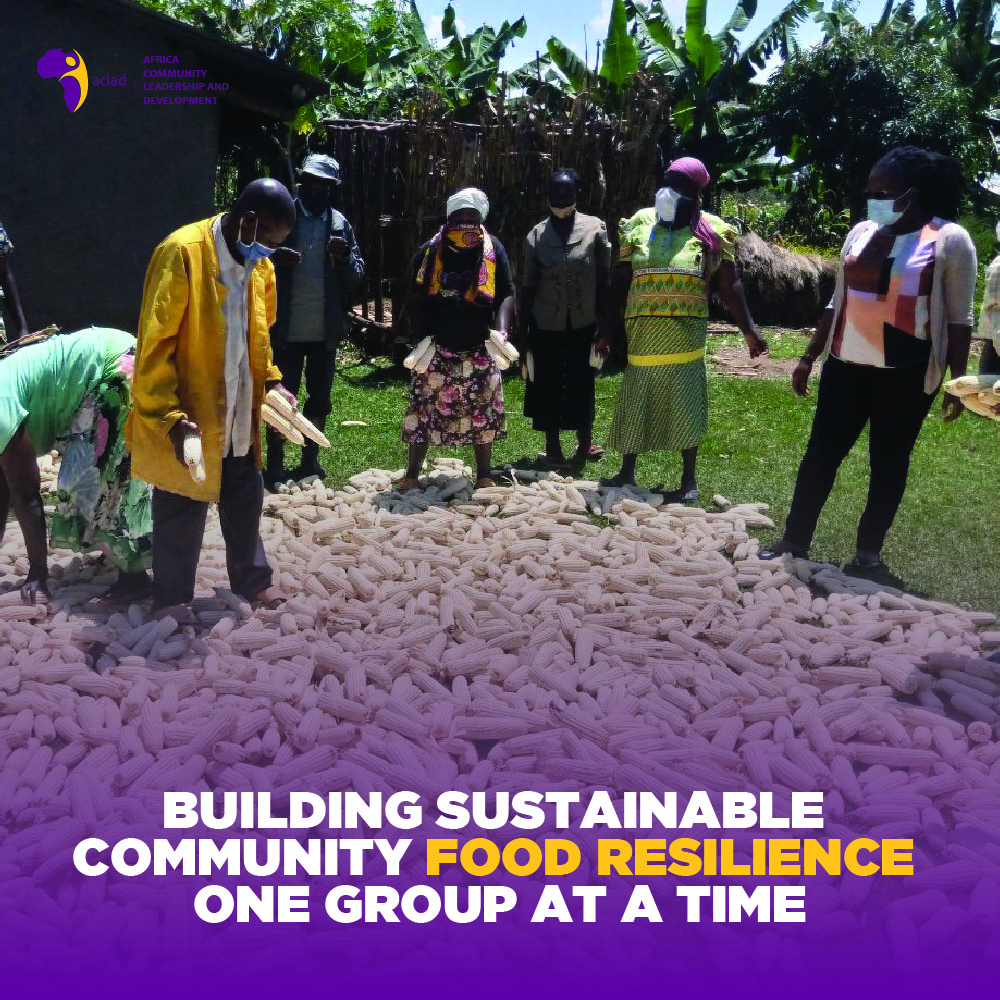Building sustainable community food resilience one group at a time

Farmers in Kenya face many challenges including high prices of farm inputs, rainfall-dependent
yields, weeds and insect pests, as well as soil erosion caused by wind and rain all of which reduce
yields. Due to intensive farming practices in the past without input of nutrients, most soils are
nutrient-deficient and have low organic matter, resulting in poor yields, stunted growth, death of
plant tissue, or yellowing of leaves. The main nutrients needed by plants for growth are nitrogen,
phosphorus and potassium. These together with the trace elements of calcium, magnesium and
sulfur are essential for soil fertility. Replanting of maize, rice and other hardy crops in the absence
of crop rotation depletes the soil nutrients and reduces soil fertility especially if animal manure is
not used. One solution to the bulk of these issues is conservation agriculture.
Conservation agriculture 1 is described by the Food and Agriculture Organization of the United
Nations (FAO) as a way of addressing the problems of soil degradation which result from
agricultural practices that deplete the organic matter and nutrient content of the soil. This farming
method results in higher crop yields at lower production costs. Since January 2020, ACLAD has
been enhancing conservation agriculture skills among communities in Western Kenya. Our
community link workers provide on-site training and practical conservation agriculture practices
like minimal tillage, use of compost manure and fertilizers; cover crops and appropriate user-
friendly technology. On conservation agriculture principles, Julius Makokha from Majaliwa SILC
group said “Now I believe that I can plant my land without tilling it and the crops perform so well.”
Sarah Shisia from Majaliwa SILC group added that “It is really a good technology and personally I’m
willing to practice it on my land.”
ACLAD’s community link workers demonstrate the use of technologies like the jab planter and
encourage communities to set up conservation agriculture demonstration gardens where they
collectively put theory into practice. This has resulted in better agronomy practices and subsequent
increase in yield and uptake of conservation agriculture practices. The uptake of conservation
agriculture has led to some degree of food security. A group member in Makuche agrees and adds
that “Through the CA (conservation agriculture) training, we’ve had an opportunity to learn more on
good agricultural practices which in turn result in better yield. More produce means our households
will have enough for consumption and commercial purposes.”
The UN Committee on World Food Security describes food security 2 as a situation whereby all
people, at all times, have physical, social and economic access to safe, sufficient and nutritious food
that meets their food preferences and dietary needs for an active and healthy life. In June 2020,
ACLAD distributed indigenous vegetable seed varieties to members of the Majaliwa Savings and
Internal Lending Communities (SILC) in Makuche, and three groups namely, Omega, Uwazi and CHV
in Lumakanda, Kakamega County, Kenya. After receiving and planting seeds distributed by ACLAD,
one recipient, Joy Engesia from CHV group, Lumakanda said, “This variety of seeds is good compared
to the ones I buy at the market because I haven’t seen any pests on my crops.”
1 Conservation Agriculture in Kenya
2 United Nations’ Committee on World Food Security
At ACLAD, we rejoice with the participants as they start harvesting and selling the vegetables. This
is a promising practice of how low cost interventions can lead to high impact in community
resilience. We look forward to enhance agribusiness and conservation agriculture practices in the
communities. Julius Makokha, another recipient from Makuche SILC group Kakamega, was pleased
with his returns and said that “Certified seeds perform so well and have better yields.” Alfred Mutonyi
from Majaliwa SILC group added that “I have discovered with certified seeds and good fertilizer it
leads to more yields.” Better yields has a direct impact on meeting market demands as observed by
Violet Misimbi from Omega support group who noted that “We need to do ALVs (African Leafy
Vegetables) farming on large scale so that we can be able to meet the market demands.”
Over the years, as a way of helping people improve their livelihoods as well as combat food
insecurity and reduce poverty, the Kenyan government, as well as private companies, NGOs and
FBOs have invested in community food security projects. However, many projects implemented at
huge amounts often tend to experience difficulties with sustainability. The solution to project
sustainability is a community-based approach as a way of working in partnership with the
community and project sponsors during all stages of the project cycle.
Community-based approaches, such as the ones undertaken by ACLAD, recognize the capacities,
skills, resilience and resources of the community members and deliver solutions that support the
community’s own goals. This has the direct advantage of securing community support and
ensuring that the community will be more willing to get involved in the project.
Catherine Muteithia
ACLAD Media Consultant
